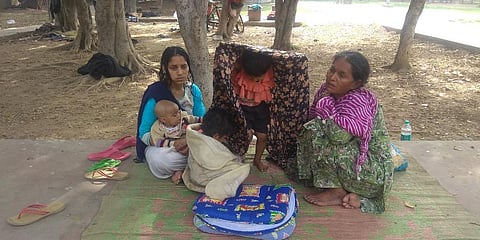

NEW DELHI: The government announced a 'Janata curfew' on March 22 last year urging people to stay home to fight the COVID-19 pandemic. A year has passed since.
While staying home was not an option for many, several people were pushed to homelessness as they were unable to afford housing during the pandemic.
The UN had urged national, regional, and local governments to take measures to secure housing rights for all. The ground situation in India shows the deepening crisis of homelessness.
Globally, around 1.8 billion people or more than 20 percent of the world’s population lack adequate housing, according to the United Nations (UN).
Data shows India has more than 1.7 million homeless people, of which 938,384 live in urban areas. Extrapolating from the 2011 Census data, around 68 million people live in informal settlements in India. The national capital has between 150,000 - 200,000 people, according to advocacy group Housing and Land Rights Network (HLRN). Of them, at least 10,000 are women.
Following the sudden announcement of lockdown, earning a livelihood came to a halt for thousands of people. Nargis, 18, is among those who were forced to leave her room in Sarai Kale Khan which she along with her husband had rented for a monthly amount of Rs 3,500.
“My husband was a rickshaw-puller. After the lockdown, we could not afford rent. The owner asked us to vacate the premises. Soon, we were homeless. We were living in a park, then a school where the police took us, and now in a park again,” said Nargis holding her eight-month-old daughter Alisha in her arms.
Now, Nargis’s home is Barakhamba Park in the Nizamuddin area -- where she gave birth to her daughter. So did her friends 23-year-old Shabana, and 20-year-old Ishrat. They have similar stories -- they had homes at one point, they gave birth amid the lockdown in Barakhamba park after being turned away by multiple hospitals, and remain uncertain if they would ever have homes.
Shivani Chaudhry, executive director of HLRN, pointed out the need for a strong human rights approach to resolve the current crisis.
“India's harsh COVID-19 lockdown followed by the severe economic crisis has resulted in deep impoverishment and extensive livelihood and housing loss, with women bearing the worst brunt. Despite the grave public health emergency, homelessness has been exacerbated by state-led home demolitions and evictions due to people’s inability to pay rent. To resolve the multiple crises, a strong human rights approach is required in the COVID-19 recovery process,” said Chaudhry.
Nargis, Shabana and Ishrat try to find hope through 19-year-old Apsana who also gave birth in the park and has managed to rent a room in Sarai Kale Khan recently. "It has been a month since we managed to rent the room. How do we stay here without any privacy? Is it safe for women to bring up their kids here? But people have no income. I do not know how long it is before we are left without a home again," said Apsana.
Ishrat and her husband were rendered homeless four months before the lockdown. While they were hoping to get back on track and manage the funds to rent a room again, the lockdown came into effect. “My husband cleans toilets in Maharani Bagh. We have a newborn now. And there is barely any income. We do not know when we can have a home again,” said Ishrat.
“Childbirth is an expense that households struggle with even in normal times. They bank on everything going as per their plan so that they can get back to their jobs. COVID will only exacerbate the chances of childbirth becoming an economic shock for a household,” said Kinjal Sampat, a Delhi-based researcher working on issues of urban social protection.
The UN had said governments should ensure housing for all through moratoriums on evictions due to rental and mortgage arrears, deferrals of mortgage payments, imposition or extension of moratoriums on forced evictions of informal settlements and slums, and suspension of utility costs and surcharges during the pandemic.
Sunil Kumar Aledia, the founder member of the Centre for Holistic Development, said the question that needs to be addressed by governments is how to breach the widening gap of housing that has been created due to the absence of incomes amid the lockdown.